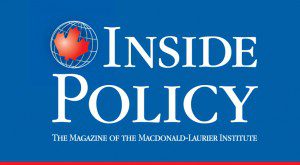 The government’s tax reform proposals represent a shift towards the individual as the unit of taxation, writes Sean Speer. Yet this ignores the strong arguments for the principle of family-based taxation.
The government’s tax reform proposals represent a shift towards the individual as the unit of taxation, writes Sean Speer. Yet this ignores the strong arguments for the principle of family-based taxation.
By Sean Speer, Aug. 25, 2017
Ottawa’s proposals to reform the tax treatment of small businesses have generated considerable debate to say the least. Consultations are still ongoing but proposals to limit the use of “income sprinkling” to family members, curb passive investment income, and the conversion of a corporation’s regular income into capital gains would represent substantial changes to Canada’s small business tax regime.
A legion of groups, including doctors, farmers, and small business owners have roundly rejected the changes as a policy-based attack on their livelihoods and retirement. At the time of writing it’s unclear whether the government will opt to proceed with the reforms in light of concerted opposition.
It’s no surprise then that this issue has been the subject of countless commentaries and different perspectives. Newspaper comment pages and social media are littered with competing voices arguing in favour or against the specific changes on various grounds. This will undoubtedly be a major political issue when Parliament returns next month.
Beneath the heightened rhetoric and “alternative facts” are competing tax principles including matters of neutrality, equity, and efficiency. Each is important. Policymakers must grapple with the inherent trade-offs.
One principle that has been overlooked, however, is the proper unit of taxation. Is it the individual? Or should it be the family? The current government has shifted to the individual as the unit of taxation and away from the family. It started with repealing income splitting for families with children. Now the changes to the tax treatment of “income sprinkling” for small businesses will further move in that direction. It’s far from clear that such a shift is justified or right.
One principle that has been overlooked, however, is the proper unit of taxation.
There are strong societal and policy arguments for the principle of family-based taxation and comprehensive family income or income splitting for tax purposes.
The societal case relates to how we actually live. Few people besides some hard-core libertarians think of themselves as only individuals. It’s our familial relationships that shape who we are and how we see ourselves. We’re spouses, parents, sons, and daughters. This is we how live day-to-day.
Think about when a family member makes a major purchase or goes on a trip or decides about relocating for a job. These judgements and choices are not made by individuals. They are reached by the family unit. It stands to reason that public policy ought to reflect how we actually live rather than based on abstraction.
The policy case rests on the basic principle of horizontal equity – that is, taxpayers with similar incomes ought to pay similar levels of taxation. Taxing families as separate individuals can offend this principle due to the differing treatment of households with different income compositions but similar family-based expenses.
A household with two earners with incomes of $50,000 each has a lower tax burden than a household with one earner making $100,000. These two households have the same total incomes and presumably similar costs and yet one faces a much lower tax burden. Family-based taxation seeks to effectively equalize their tax treatment.
Incidentally the case for family-based taxation has some historic pedigree in Canada. The 1966 Royal Commission on Taxation (thereafter Carter Commission) recommended in favour of “joint taxation” due to the “ludicrous results” of the individual-based system. The recommendation ultimately went unadopted.
Instead Canadian public policy has evolved in a hybrid model with the emphasis mostly placed on the individual as the basic unit of taxation. But this is far from the only model around the world. Other jurisdictions including France, Germany, Norway, Switzerland, and the United States provide for different forms of family-based taxation.
The Harper government moved in this direction with its so-called “family tax cut” in 2014. It wasn’t a full shift to family-based taxation but it extended the principle of income splitting to families with children. These families were able to shift up to $50,000 in income to a lower-income spouse in order to reduce their tax burden to a maximum of $2,000. The measure was estimated to benefit 1.7 million families and reduce revenues by roughly $2 billion per year.
France, Germany, Norway, Switzerland, and the United States provide for different forms of family-based taxation.
The Trudeau government has since repealed its predecessor’s policy on the grounds that it disproportionately benefited high-income earners. Its focus on vertical equity – that is, those earning more ought to pay more taxes – superseded questions of horizontal equity or the proper unit of taxation. Put differently: its “fair share” narrative trumped other principle-based considerations of how the tax system ought to function.
Ottawa’s proposed changes to “income sprinkling” inside small businesses (or what are known as Canadian-controlled private corporations) are following a similar path. Income sprinkling essentially refers to payments (including dividends) to family members in lower tax brackets via a corporation. The reforms would now subject these family-based payments to a “reasonableness test” and possibly higher tax rates to deter using these corporations for “tax planning.” They are mostly framed around tax fairness and the “wealthiest one percent.”
Concerns about tax equity and neutrality are justified. Leading tax economists such as University of British Columbia’s Kevin Milligan have shown how income sprinkling can be taken advantage of in the current tax system. This is a legitimate issue that requires careful study and consideration.
But it shouldn’t occur in isolation or without broader discussion about the functioning of the tax system and the right unit of taxation. The risk is a singular focus on equity and fairness obscures other principles at play including how public policy ought to treat families.
This isn’t an insignificant point. Recent Census data show that the Canadian family is facing stresses and challenges. We also know that intact families are a key determinant of economic and social outcomes. It seems reasonable then that any tax changes should be part of a broader policy debate about how we can sustain and strengthen families. As I’ve written elsewhere, there’s room for public policy to play a greater role in supporting marriage and families.
One final point: the case for such a broader review and debate is only strengthened by the fact that the government has maintained the family unit as a basis for other policies. Its Canada Child Benefit is means-tested based on family income. Pension income splitting also remains in place for seniors, which incidentally has similar distributional effects as income splitting for families with children. It seems the choice of the individual versus family unit sometimes depends on budgetary costs or political calculus rather than fidelity to policy principle.
The upshot is that we shouldn’t let the fierce debate about the government’s proposed changes to the tax treatment of small businesses to obscure broader questions about how we treat families in Canadian public policy. It matters too much to let them go unaddressed.
Sean Speer is a Munk senior fellow at the Macdonald-Laurier Institute.




